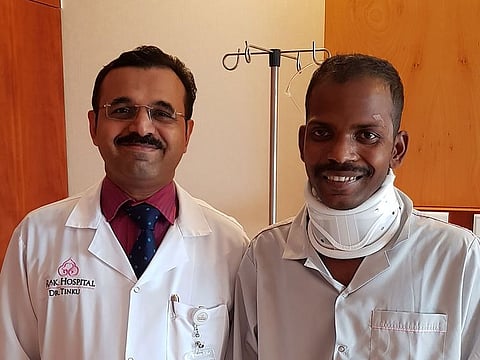Rare surgery saves worker from paralysis after fall in Ras Al Khaimah, UAE
Despite breaking his neck in February, Ajeet Ram Sudhar is already back to work

Dubai: A young construction worker who broke his neck, after falling from a height of three metres at a building site, has managed to avoid becoming a quadriplegic — thanks to a rare emergency medical procedure performed by experts at RAK Hospital on February 15.
Ajeet Ram Sudhar, 29, from North India has since made a full recovery and returned to work in the first week of May.
Doctors at RAK Hospital discovered that Sudhar had shattered his neck upon falling from the building and fragments were compressing his spinal cord, calling for urgent surgical intervention by consultant neurosurgeon Dr Tinku Jose Kurisinkal.
“The patient completely crushed his neck bone and that was causing compression of his cervical spine,” said Dr Kurisinkal.
“In cases like this the patient has every chance of debilitaton of his neck and limbs leading to quadriplegia.
“We did a surgery called anterior cervical decompression and fusion. We first cleaned out the shattered bone fragments pressing on the spine using a microscope and later in a very delicate surgery put in an expandable cage and on top of it fixed a titanium plate,” he added.
Explaining the challenges Dr Kurisinkal said: “There were two major challenges during the surgery. Firstly, the cervical vertebra was destroyed into multiple pieces which had to be carefully removed without injuring the spinal cord. Secondly, anaesthesia [intubation] was a challenge because any mobility in the neck could have led to paralysis.”
Dr Kurisinkal and his team carried out the procedure in two steps.
“In the first part of surgery, all the crushed bone fragments were carefully removed with a microscope along with the extruded disc fragments,” he said.
“In the next phase of surgery, the gap was filled with an expandable cage, some bone cement and further anchored by special titanium plates on both ends of the cage. The cage was fixed to normal verterbrae above and below to give stability to the spine,” he added.
The surgery took approximately seven hours and the patient was taken off anaesthesia half an hour later. Within eight days Sudhar was pain free and had gained enough strength to be discharged and moved to his residence.
He wore a collar for the next two months and has since been able to resume all functions.
Talking to Gulf News, Sudhar said: “I’m the sole breadwinner of my family and have a child too. I was so scared that this fall would lead to paralysis but thanks to Dr Kurisinkal, I have been able to stand and get most of my functions back. There is still a little bit of pain and stiffness, which I hope will go away with time. Considering I was to face a life of lying in bed without movement, I am happy that I escaped that.” he added.
Dr Kurisinkal added that it was important to create awareness about spinal injuries suffered by construction workers during such falls.
“In similar injuries it is important not to move the patient at all after such a fall,” he said.
“Any such displacement can lead to irreversible damage to the spine. The paramedics need to stablise the neck and spine and the patient has to be carefully transported to the hospital using a spinal board. A surgery like this is rare and uncommon but can be carried out to avoid near certain quadriplegia.”


